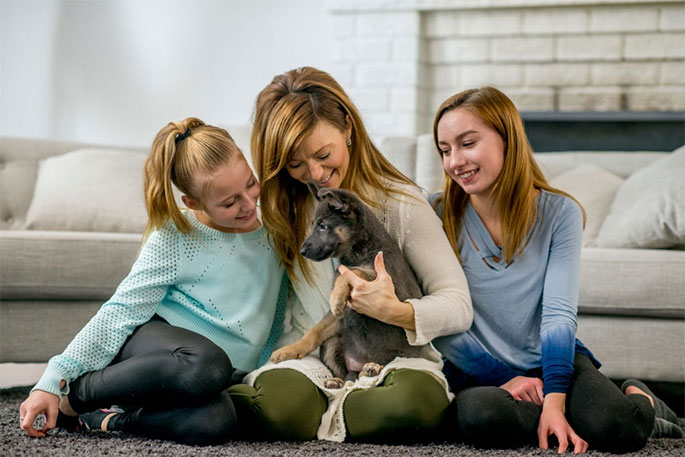
Suffering from a serious case of furball fever? Do you have an insatiable desire to invite another canine into your pack? Before heading to the nearest shelter or contacting a reputable breeder, you’ll want to carefully assess how an addition might affect the dynamics of your household. While some dogs may readily welcome a new member into their family, others might have a hard time adjusting to the change.
Read More:
- Dog Hiking Gear: 5 Essentials For Every Type
- Everything to Know Before Moving With a Dog
- 10 Tips for Road-Tripping With Your Dog
- Best-Rated Dog Food For Puppies 2018
- 5 Tips To Welcome Your New Puppy Into Your Home
The Positives
Inviting a second dog into your family can be a very rewarding experience. If you choose wisely, your current pet and the new one could become fast friends and playmates. Do you have a dog with separation anxiety? A canine companion could potentially help your pup overcome its fear of being left alone.
Another positive? Having an exuberant puppy in your household could bring out the playfulness in an older pal. It’s always fun to watch two dogs cavort and run around together. Some people also believe that it’s a good idea to get a young dog while they still have an older one to teach it the ropes. By watching the adult, a puppy could learn such things as where to pee (not in the house!) and how to respond to certain commands.
Are You (and Your Dog) Ready for a New Pack Member?
The decision to get a new pet should never be taken lightly. All dogs deserve a forever home. Yet, too often, owners don’t think through the consequences of bringing home a new pack member, and they choose a dog that turns out to be a poor fit for their household. Sadly, these animals often end up in a shelter where they could be euthanized. Before you adopt another fur baby, it’s important to ask these questions:
- Can I afford another dog?
When you welcome a new dog, you’ll be doubling all of your current costs, including those for the vet, pet insurance, food and boarding. Depending on the breed, you may also add new bills to the pile. For example, some varieties — such as doodles and certain terriers — require regular grooming appointments that can be very expensive. Plus, if the new pup is very energetic, you may have to invest in a dog walker or doggy daycare. - Does my current pet have the right temperament for a “sibling?”?
Not all dogs enjoy having another canine in their home. They may be possessive of you or their belongings and could attack another dog that gets too near. One thing to try before permanently adopting another pet is to foster or dog-sit. That way, you can see how your pup will deal with a new furry friend. - Are my living arrangements appropriate for another dog?
If you plan on moving in the near future, be aware that many rentals and some homeowner’s associations have restrictions on the number and size of pets allowed in their units. It might be difficult to find a new place to live if, say, you own two large-breed dogs. - Will I have the energy to deal with a dog that may have issues?
Maybe you forgot how much “fun” you had housebreaking your current dog or teaching it not to eat every shoe. A new puppy may come with its own complications that could raise the stress-level in your home. For instance, you might end up with a non-stop barker or a dog with separation anxiety. If so, will you have the energy necessary to deal with these issues? - Do I have the time that a second dog may need?
In general, a second dog will require approximately five extra hours of attention and care per week. There will be double the messes to clean up, and you may have to figure out how to walk two pups. - Is the timing right for a new addition to our family?
Are you expecting a new baby or have small children that require a lot of time and attention? Is the current dog ill? Bringing a new pup into these types of situations can cause your family members and your current canine unnecessary stress.
Keep Your Expectations Realistic
Imagine if the dog came home one day with a new human. You and your pet have been living happily together for several years (or so you thought). Now, this new human has bounded into your house. He is eating your food, sleeping in your bed and playing with all your belongings. This is probably going to put you in a foul mood. Yet, as time passes you and the new human might start to get along. He understands what things he should and should not do, and you start to accept that this new member of the family isn’t going anywhere.
By mentally swapping roles like this, you can see why it may take a little time for the dog to adjust to a newcomer. In a perfect world, your pets may become good friends after a short adjustment period. However, there is also a chance that they may never form a tight bond. Make sure to keep expectations realistic, and don’t assume the puppies will be instant best buds.
Finding the Right Dog
When looking for a second dog, there are several key factors to consider, including:
- Temperament – Try to avoid bringing in a dog with an alpha personality. If your current canine is passive, the new one could end up terrorizing it. On the other hand, if both have alpha personalities they’re bound to fight for dominance.
- Sex – Many people believe that owners should get the opposite sex of their current dogs. Either way, it’s best if both animals are fixed.
- Size – If possible, choose a dog that is not substantially smaller or larger than your current pet. A big dog could inadvertently injure a smaller one by running into it or even stepping on it.
A Happy Pack
Many households can have two or more dogs living very successfully together in peace and harmony. By carefully choosing a new pack member and making sure the timing is right for your entire family, you too can experience the joys of being welcomed home by more than one wagging tail.
Author bio: Stephanie N. Blahut is Director of Digital Marketing and Technology for Figo Pet Insurance. Figo is committed to helping pets and their families enjoy their lives together by fusing innovative technology — the first-of-its-kind Figo Pet Cloud — and the industry’s best pet insurance plans.




